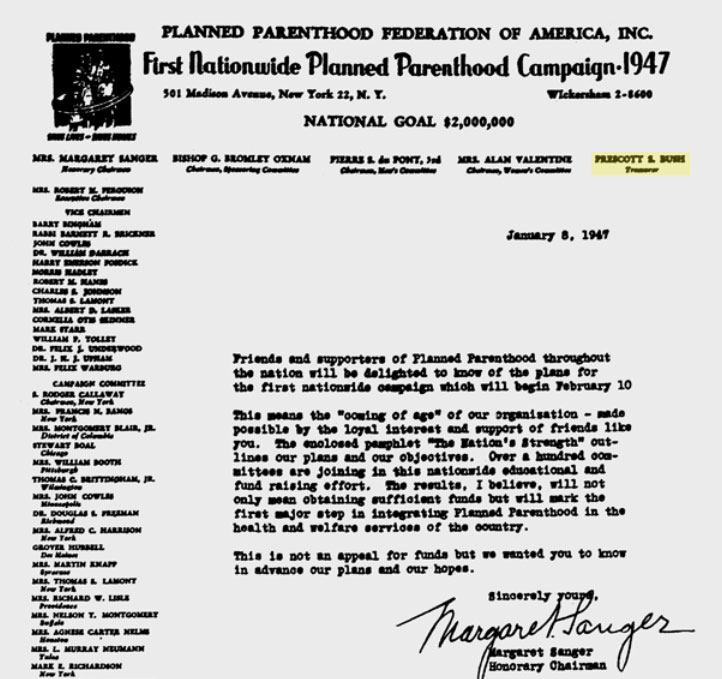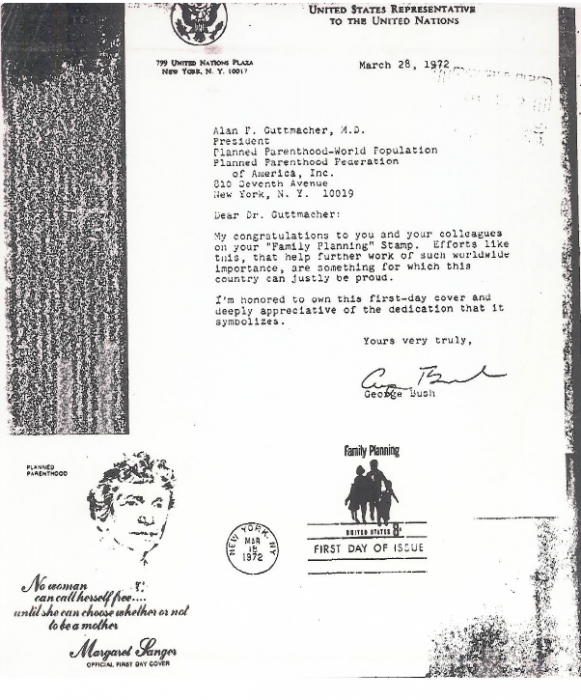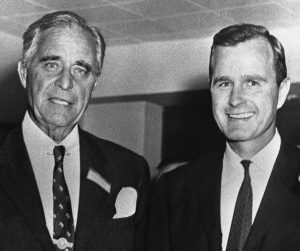One of the chief co-sponsors of the Title X statute, which allocates millions of federal tax dollars to Planned Parenthood and other family planning organizations, was Rep. George H.W. Bush (R-TX), who later became our nation’s 41st president. In 1970, the United States House of Representatives voted 298 to 32 to approve the Family Planning Services and Population Research Act, Title X of the Public Health Service Act, authorizing federal dollars to pay for family planning services to low-income women. The Senate had previously approved the legislation, which was also supported by Republican President Richard Nixon (more on Nixon’s views on race and population control here), and established the Office of Population Affairs within the Department of Health Education and Welfare to oversee it.
Just prior to the 1970 passage of the Family Planning Act, Congressman George H.W. Bush suggested that family planning needed to become a “household word”:
We need to make population and family planning household words. We need to take sensationalism out of this topic so that it can no longer be used by militants who have no real knowledge of the voluntary nature of the program but, rather are using it as a political steppingstone. If family planning is anything, it is a public health matter.
Bush was instrumental in creating the National Center for Population and Family Planning in the Department of Health Education and Welfare. As chairman of the Republican Task Force on Population and Earth Resources in 1969, created in part to ascertain the resistance to family planning among “certain groups,” Bush admitted that “Population Control and Family Planning is too important to giggle about now.“
He added:
The purpose of this group is to study the problem. It’s less a question of specific legislation than of a willingness to come face to face with these problems and then act on them.
We are trying to access the resistance to family planning by certain groups. So far, it looks like opposition from religious groups and the Black militants isn’t too serious.

Media reports at the time suggested that Bush’s interest in family planning began with his involvement with Planned Parenthood in his hometown of Houston. But the truth of the matter is that George H.W. Bush was not the first Bush family member to be active with Planned Parenthood. In a foreword to a book on population control, the former president wrote that his father’s (Prescott Bush) involvement with Planned Parenthood also motivated his views:
My own first awareness of birth control as a public policy issue came with a jolt in 1950 when my father was running for the United States Senate. Drew Pearson, on the Sunday before Election Day, “revealed” that my father was involved with Planned Parenthood. My father lost that election by a few hundred out of close to a million votes. Many political observers felt a sufficient number of voters were swayed by his alleged contacts with the birth controllers to cost him the election. The subject was taboo not only because of religious opposition but because at that time a lot of people were unwilling to discuss in public what they considered a private matter.
This Planned Parenthood fundraising letter (pictured left) dated January 8, 1947, lists Prescott S. Bush as treasurer of Margaret Sanger’s first national fundraising drive. At one point in his political career, Prescott Bush’s advocacy of birth control, which may have originated with his wife Dorothy, had also been credited with costing him his seat in Congress. An excerpt from “The Bush Tragedy,” written by Jacob Weisberg and published in the New York Times, elaborates further:
In 1950, [Prescott] Bush was running even with William Benton, the Democratic nominee. But on the Sunday before the election, the muckraking columnist Drew Pearson asserted on his radio show that Prescott was treasurer of the Birth Control League. In the days before Griswold v. Connecticut, birth control remained illegal in the majority-Catholic state. While the family has long decried this as a smear, it was in fact a minor distortion — carefully orchestrated for maximum harm. Prescott was listed as treasurer on a letterhead for Planned Parenthood, a successor organization to the Birth Control League, which had closed up shop in 1942. Though he denied the charge, Prescott lost by 1,102 votes.
In 1952, Prescott Bush won his Senate seat. Later, his son George would follow in his steps with his pursuit of politics as well as his support for Planned Parenthood. In fact, as a result of his deep interest in population control and family planning, George Bush, Sr. earned the nickname “Rubbers” from House colleagues.

George HW Bush congratulates Alan Guttmacher on “Family Planning” stamp
On March 18, 1972, then US Representative to the United Nations, Bush congratulated Planned Parenthood’s president on the unveiling of a “Family Planning” stamp they had lobbied for. The “Family Planning” stamp was originally created as a way to honor Margaret Sanger, but after five years of debate, it was finished without any reference to Sanger. At that time, Bush wrote to congratulate Alan F. Guttmacher (the president of Planned Parenthood), who sponsored the stamp. “My congratulations to you and your colleagues on your ‘Family Planning’ Stamp,” he wrote. “I’m honored to own this first day cover and deeply appreciative of the dedication that it symbolizes.”
George H.W. Bush’s support of family planning and Planned Parenthood continued until the 1980’s when he was chosen as a vice presidential running mate by Ronald Reagan. A summary published by the pro-abortion Association of Reproductive Health Professionals website explains:
From 1971 to 1980, [TitleX] appropriations grew from $6 million to $162 million. Four of the six largest increases in the program’s 40-year history happened in its first 10 years. However, by 1981, Title X would fall victim to the burgeoning culture war; former champion George H.W. Bush would serve as Ronald Reagan’s vice president and go onto his own term as President — repudiating his pro-family planning position in favor of using it as the “political stepping stone” he had once publicly abhorred.
Despite his initial support of Planned Parenthood, President George H.W. Bush called for the overturning of Roe v. Wade. He has been credited with the nomination of one pro-life Supreme Court Justice as well as with defending pro-life measures that prohibited federal funding of abortion and the importation of RU-486, the chemical abortion pill. While some suggest that Bush’s change of heart was political, many believe the legalization of abortion played a huge role in his turn. This is reflected in a letter he wrote in 1989, which he published in his book “All the Best, George Bush, my life in Letters and Other Writings.”
“I strongly support family planning and have always favored disseminating information on birth control. I do not favor advocating abortion in any way, shape, or form. Planned Parenthood to my regret, has chosen to be in the forefront of the pro-choice pro-abortion position. The lines are so clear…”
Live Action News has written additional articles on this topic that include the history of Title X (parts one, two, three, and fou
Editor’s Note, 11/8/18: Related links added.








